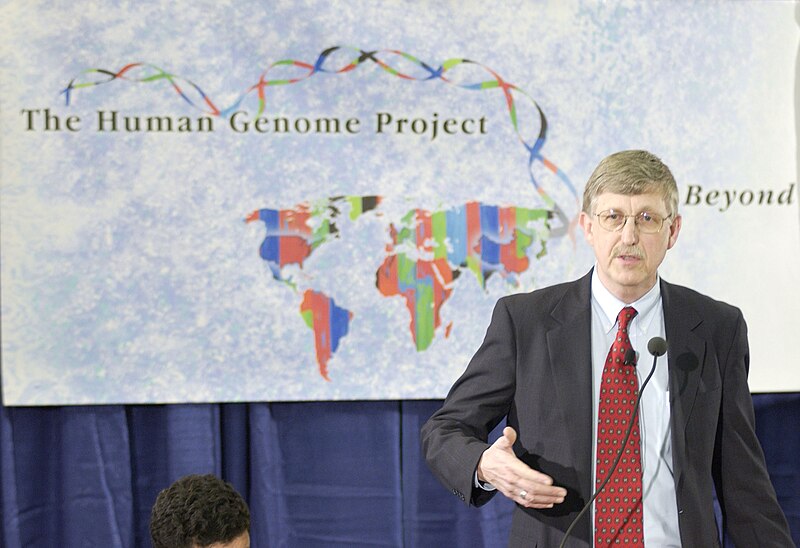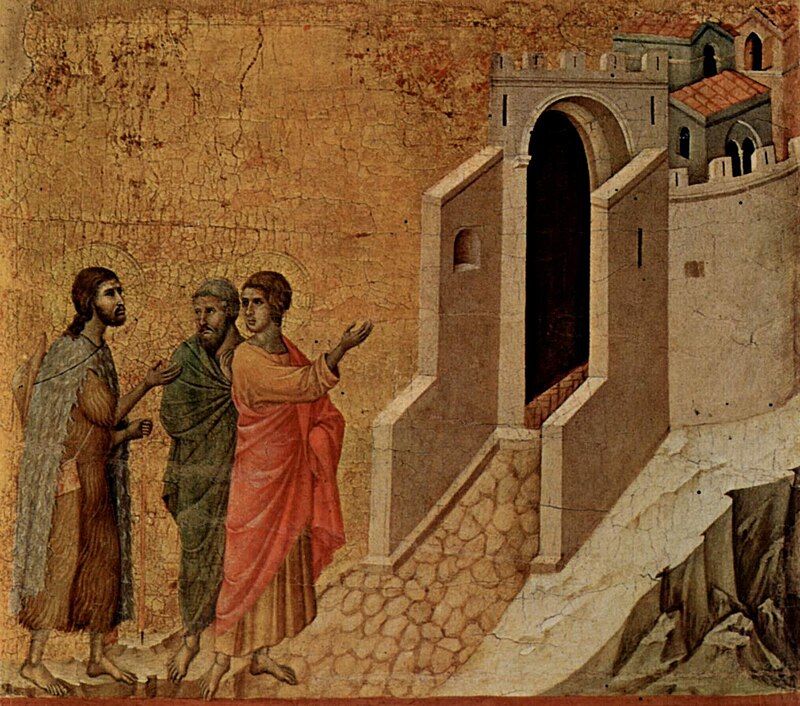
When Abraham sees three visitors walking toward his tent he’s thrown into a tizzy. We can imagine Sarah laughing already as her 99 year old husband bursts into the tent, “They’re coming! They’re coming!” He has no idea who they are but friend or foe, he wants to show them some hospitality when they arrive, so he tells Sarah to make some cakes in a pan, and tells a servant to slaughter a calf and prepare it. Apparently what an ancient nomad serves to first time guests is pancakes and veal.
Sarah hears them arrive. There are three of them but she only hears one voice. It doesn’t take long. She knows it’s the Lord. God in three persons. Abraham washes their feet and offers them some food, and he stays with them while they eat.
“Where’s Sarah?” the Lord asks.
“Uh, she’s in the tent.” Abraham says.
“It won’t be long now, you know?” says the Lord, “Nine months, say? Next time I come by she will have your son.”
Sarah heard those words from inside the tent, and she laughed.
“Why’re you laughing in there?” the Lord asks.
“I did not laugh!” Sarah lies.
“Oh yes you did, laugh!” the Lord replies, adding, “Is anything too wonderful for the Lord?”

That question hangs there in the air, even as the story moves on. It’s an open question hangs over us too, “Is anything too wonderful for the Lord?”
Gone are the days when belief in the God of Abraham can be assumed. Instead in our secular age, all belief is questioned, especially the question of whether there is a Lord and whether or not this Lord can do wonderful things.
There was a young man who loved science, he majored in Chemistry at college, studied Physics in graduate school, and ended up getting a PhD in physical chemistry and then he went to med school. He loved science because it permitted him to continually ask questions and then find verifiable answers. Like most of his colleagues, he was an atheist.
“If you were to bring up questions about God among me and most of my peers in graduate school,” he reports, “you would have been laughed out of the room” What he loved about science is that it constitutes proof: what you can see, hear, touch, measure, and verify.
Sarah is the scientist in this story. She’s behaving rationally. How could it be that in her latest years of life she should conceive and bear a son with 99-year-old husband? It’s as laughable to her as it is tragic. She’s lost hope, and she’s left to believe that what she sees is all she’ll get.

It was in his third year of medical school that this young scientist had to get out of the lab and start seeing actual patients in hospitals. He recalls seeing many patients who were in their last days, many in pain and suffering as they approached death, and he was faced by the truth that all of the science at his disposal could not save them.
He had noticed among his patients that some of them, though in the midst of death, radiated with a peace and tranquility which he could not understand. Over time he discovered many of these people were people of faith.
He remembers one particular patient, an older woman of whom he had grown quite fond, almost like a grandmother. On her deathbed she told him all about her faith, about what God had done for her, and how she trusted in the Lord to take her the rest of the way, into death and beyond it.
Then she turned to him and said, “Well, doctor, I’ve told you about my faith. What about you? What do you believe?” This question broke him as he realized it was a question for which he had no answer.

To live in our secular age is to wrestle with questions like this. Even the most faithful among us have to face this question because whether we realize it or not we’re all scientists at heart. We prefer to trust in what we can see, and hear, and verify. Nevertheless at some point, something pushes us, life pushes us into questions we cannot answer, forcing us to question if there really might be something deeper, something more wonderful.
The scientist left that woman’s bedside and ended up knocking on the door of a church nearby. He met the pastor, then the people of the church, and together they listened to all his questions. Where answers were available, they offered them. Where they weren’t, they prayed for them.
He later reported “Frankly, I thought my questions would take me to a place of documenting and strengthening my atheism. To my surprise, it turned out differently.”
That scientist is now a Christian, and still a scientist, a somewhat famous scientist, the lead scientist on the Human Genome Project. Dr. Francis Collins has been awarded medals of honor by George W. Bush and Barack Obama, and most recently served under President Trump as the director of the National Institutes of Health where he led the global effort to develop a vaccine and other treatment against COVID-19, succeeding in record time.

Today, when asked, he speaks about all of this in the language of faith saying, “I find it to be incredibly uplifting that so many people have been praying for deliverance from COVID-19, and low and behold it has come. Here’s a vaccine that, with God’s grace and a lot of human hard work, is even more effective and safe and wonderful than we dared to hope for.”
Even more wonderful than we dared to hope for. “Is anything too wonderful for the Lord?”
For Sarah the scientist that question remained an open question until, three chapters later, “the Lord did for Sarah as he promised, as she had prayed. Sarah conceived and bore a son, and they name him Isaac, which means “laughter.”
It is from this laughable family that we receive our Lord Jesus Christ in whom God has taken on flesh which can be seen, and heard, and touched. He preached of a God so wonderful that we regarded him as a laughing stock, but by his death and resurrection he has done the impossible, opened what was closed, and made even of death a way to life.

On Easter morning it was the women who went back to attend to his dead body when near the opening of the tomb there were not three but two men standing there in front of them. As Abraham did outside the tent the women bowed their heads before them.
The two men laughed and asked a question, “Why do you seek the living among the dead? Is anything too wonderful for the Lord? He is not here. He is risen, just as he told you.”
Later the Lord appeared to two other men on the road. They told him about this rumor the women are spreading that their Lord has been raised, but they still find it too wonderful to be true. He laughs at them and asks a question “You fools! Is anything too wonderful for the Lord? Haven’t you read the Bible?” and he interprets the scriptures to them, starting in Genesis, showing all the places where he had already shown up.
They don’t realize it’s him until they sit down together at the end of the road for some pancakes. When he breaks bread with them, then they know. It is the Risen Lord.
Later he appears to a group of them and asks another question “Why are you troubled, and why do doubts rise in your hearts? See my hands and my feet,” he says, “It’s really me. Touch me, and see. Verify for yourselves.” He shows them his hands and his feet. And, while they still disbelieved, he asked them one more question, “Have you anything here to eat?”
“Is anything too wonderful for the Lord?” It’s a question that hangs over our heads, but hear the good news: it’s a rhetorical question. It’s already been answered. Whether we believe it or not, the most wonderful thing has happened.
The God of Abraham, Isaac, and Jacob, a God who hears, and sees, and speaks, and shows up, and eats, has come. He has come to be heard, and seen, touched, even. He has come to die our death and restore our life.
To this day, he comes to dine with doubters and defyers, at deathbeds speaking and working through doctors and the dying. To this day comes he continues to break open what is closed like a stone being rolled away from a tomb, from our quiet questions birthing renewed and eternal hope.
The question still hangs in the air, “Is anything too wonderful for the Lord?” but again today Mother Sarah, and Dr. Collins, and the Risen Christ turn to us, with a little laugh saying “No.”
The story of Sarah and Abraham has been a great comfort to me for the last couple of years. My husband and I have been trying to conceive for about two years now, and last year we were excited to find out that we were pregnant, but six weeks in I miscarried. I keep reminding myself that these things happen in God’s time, and I keep remembering how Sarah laughed when they said she would have a son. Your perspective of the story encourages me in a way I wasn’t expecting. There is nothing too wonderful for the Lord. Thank you for writing it.
LikeLike
Thanks for commenting Sarah. Sorry for your difficulty, loss, and grief. My wife and I have infertility experience too. We now have 3 kids now but none of whom were conceived by conventional means. I’m glad you were encouraged and will pray for you.
LikeLike